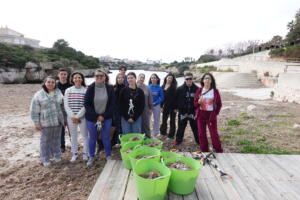Plastic Free Menorca Alliance – Project Highlights with BeMed
Plastic Free Menorca Alliance Successfully Concludes Its Initiative Supported by Beyond Plastic Med

Over 2,800 waste items categorised, 3 new products developed using non-recyclable waste, and 5 businesses advised: summary of the past year’s work
After twelve months of work, the Plastic Free Menorca Alliance has successfully concluded the initiative supported by Beyond Plastic Med (BeMed), focused on reducing plastic pollution in Menorca. Thanks to the support of this international organisation, with a grant of €10,000, three key actions have been implemented, making an impact on the environment, education, and the local circular economy.
On the one hand, five establishments from the hospitality sector were supported through the certification process under the Plastic Free Balearics label. Three of them achieved up to four stars after implementing changes to eliminate illegal plastic products and adopt more sustainable alternatives. This action involved reviewing more than 100 products, of which 15 were found not to comply with current regulations.
“Certification often becomes the only time many businesses receive information about regulatory requirements and about ‘honest’ and ‘real’ alternatives,” says Marta Pérez, coordinator and certification lead for Plastic Free Balearics in Menorca. “Businesses respond very positively to the process, expressing their gratitude for the advice and technical support we offer – and all free of charge.”
In parallel, five educational outings were organised with the schools CEIP Tramuntana, CEIP Francesc d’Albranca, Col·legi Concertat Cor de Maria and PASCAL Private English School Lefkosia, with sampling points at Platja Gran, Platges de Fornells, Binigaus and Tàlis, covering a total area of 2.9 hectares. A total of 212 pupils took part, helping the Alliance to identify and categorise 2,882 waste items, removing over 100 kg of plastic waste from Menorca’s coastline. The most commonly found items were: 605 plastic caps and lids; 602 wet wipes (all from Platja Gran); 302 cotton bud and sweet sticks; 293 pieces of polystyrene; and 272 pieces of rope.
“We continue to contribute to the mapping of marine pollution in Menorca, and each field trip is an opportunity to understand the type and extent of the plastic pollution affecting the island,” explains Marta Pérez, coordinator of Plastic Free Menorca. “These outings allow schools to engage in activities beyond the classroom, where we observe, analyse and propose actions based on the data collected during the trip.”
Finally, the PescArt Menorca project has continued to grow, incorporating three new types of hard-to-recycle waste through two open workshops: broken parasols, discarded wetsuits and microplastics collected during fieldwork. These materials – specifically, 57 broken parasols, 57 wetsuits and 10.25 kg of microplastics – have been transformed into decorative frames, fans, raincoats, footwear components and other items and accessories. From among these products or pieces, three were selected for a technical and economic feasibility study, which yielded promising results.
“The incorporation of new waste types into the PescArt Menorca project confirms that creativity and sustainability can go hand in hand,” adds Núria Sintes, coordinator of PescArt Menorca.
“We are proud of the work carried out this year. Seeing students and businesses getting involved shows that the Menorcan community wants to be part of the solution,” says Marta Pérez, coordinator of the Alliance. This work forms part of Menorca Preservation’s long-term strategy to reduce plastic pollution, encourage reflection and conscious change among businesses, professionals and entrepreneurs in the arts sector, and the wider public.
The Plastic Free Menorca Alliance is deeply grateful for this second round of support from BeMed, following the initial collaboration in 2020.